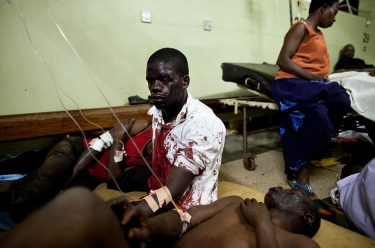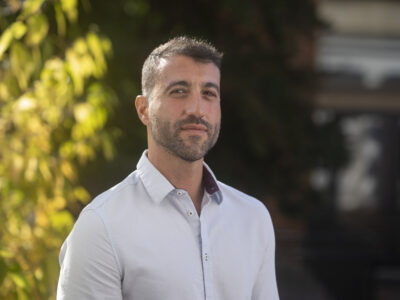Torcedores se reuniram em bares e restaurantes ao redor do mundo para assistir ao jogo final da Copa do Mundo na noite passada. Em Uganda, essas celebrações foram interrompidas quando bombas explodiram em dois locais populares de diversão noturna em Kampala, capital do país.
A mídia de Uganda está relatando [En] mais de 40 mortes até agora, com dezenas de feridos nas explosões. A polícia de Uganda têm sugerido que o grupo militante somali Al-Shabab esteja por trás dos ataques. Um dos comandantes do grupo, recentemente convocou [En] ataques contra o Uganda, que contribui com tropas para a força de paz da União Africano na Somália. O grupo elogiou os ataques, mas não assumiu a responsabilidade.
Vítimas dos dois ataques mortais à bomba em Kampala esperam por tratamento no Hospital Mulago. Foto de Trevor Snapp. Usado com permissão do fotógrafo.
O blogueiro ugandense Gay Uganda escreve:
Uganda attacked. Really, it is humanity attacked. Who has the gall to be happy at such atrocity? Apparently, Somali insurgents are happy. Because they are fighting African Union troops in Somalia, who have stopped them from establishing an Islamic state under Sharia law.
….What I see are country mates, human beings who were doing nothing worse than watching a football match who were killed and maimed, in the name of ideals that they may have no real thought about, actions that they cannot control in the least.
Uganda atacada. Realmente, é a humanidade atacada. Quem tem a coragem de ser feliz com tal atrocidade? Aparentemente, os insurgentes da Somália estão felizes. Porque eles estão lutando contra as tropas da União Africano na Somália, que os impediu de estabelecerem um Estado islâmico sob a lei da Sharia.
….O que eu vejo são conterrâneos, seres humanos que não estavam fazendo nada pior do que assistir a um jogo de futebol, que foram mortos e mutilados, em nome de ideais que eles podem nunca ter pensado sobre, ações que eles não podem controlar pelo menos.
Ernest Bazanye adverte contra tirar conclusões precipitadas sobre quem detonou as bombas:
It’s too early to say who is responsible or why, and even though it is whispered abroad that it was a pair of suicide bombings staged by Al-Shahab, the Somali terrorist organization. We should know by now that the truth doesn’t get here that soon and that any conclusions now would be premature.
Trevor Snapp, um fotógrafo documentarista vivendo em Kampala, estava no Hospital Mulago, onde muitas das vítimas foram levadas, após os atentados. Ele escreve:
Family members milled around the front reception area while doctors and bodies covered in blood were rushed in and out of surgery. In the surgery hallway a man’s body lay in the floor bleeding by his head, it was impossible to know if he was dead or alive. A few feet away in a small storage locker, staff had created a makeshift morgue, 6 bodies lay on the tiles, some had their clothes blown off. They were all young.
Muitos blogueiros estão chocados que os ataques tenham acontecido em Kampala, conehcida como uma das mais seguras capitais africanas. Joshua Goldstein, um ex-autor do Global Voices que vivia em Kampala, descreveu os locais onde os ataques aconteceram:
Kampala's Rugby Club is a sprawling bar, adjacent to the pitch, where many of Kampala's college students come to hang with their buddies. If Uganda had fraternities, this is where they would throw their parties. Here the smart set drink Nile Special with reggae and hip hop blasting in the background.
….Across town Ethiopian Village, down the street from the American Embassy, is in the dead center of Kabalagala, the Las Vegas of Kampala. The restaurant, the most high end of the half dozen or so Ethiopian restaurants within 500 meters, sits at the intersection of Ggaba Road and Tank Hill Road. In the afternoon, Ethiopian dissident journalists pass their exile by chewing miraa and discussing the day's news. At night, the neighborhood lights up with bars and dance parties.
O Clube de Rugby de Kampala é um bar amplo, junto ao campo, onde muitos dos alunos da faculdade de Kampala vão para sair com seus amigos. Se Uganda tivesse fraternidades, este é o lugar onde elas iriam ter suas festas. Aqui o conjunto esperto bebe Nile Special [Nilo especial] com reggae e hip hop explodindo ao fundo.
…. Do Outro lado da cidade, a Aldeia da Etiópia, na rua da embaixada americana, está no centro morto de Kabalagala, a Las Vegas de Kampala. O restaurante, o melhor da meia dúzia de restaurantes etíopes dentro de 500 metros, fica no cruzamento da Ggaba Road e Tank Hill. Na parte da tarde, jornalistas dissidentes etíopes passam seu exílio mascando miraa e discutindo as notícias do dia. À noite, o bairro se ilumina com bares e festas dançantes.
Sleek escreve:
To give this a little perspective, I’ll point out that up-til now, Kampala has been one of those places where at 03:00 AM, one can walk from one end of the city to the other. And that we are the kind of people to complain about rising fuel prices, high Pay As You Earn taxes, impossible airtime charges…basically a very high cost of living. But in all this, we’ll still go to that new hangout place and pay UGX 5,000 for a beer. And we fill the place to the point that you literally have to fight your way to the bar to get a drink. And that’s the average hangout.
And then you hear about bomb blasts…
Para dar uma pequena perspectiva, vou salientar que até agora Kampala tem sido um daqueles lugares onde às 03:00 pode-se andar de uma extremidade da cidade à outra. E que nós somos o tipo de pessoa que se queixa dos preços dos combustíveis, de pagar altos impostos com tudo que você ganha, dos encargos impossível de TV a cabo… basicamente um custo de vida muito elevado. Mas em tudo isto, nós ainda vamos para aquele novo lugar da moda e pagamos UGX 5.000 em uma cerveja. E nós preenchemos o lugar a tal ponto que você literalmente tem que lutar para abrir caminho para o bar para beber um copo. E esse é o ponto de encontro comum.
E então você ouve sobre as explosões…







1 comentário